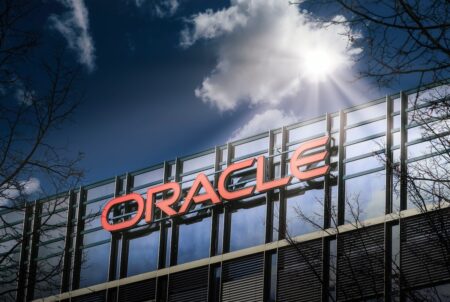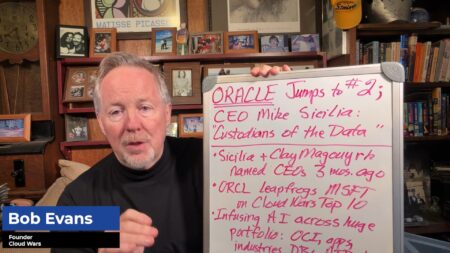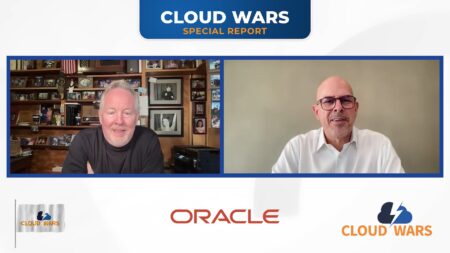
In one of the most tone-deaf statements I’ve ever heard from a tech-industry executive, Microsoft Chief Commercial Officer Judson Althoff bashed the rise of onshoring because “we’re kind of all citizens of the planet.”
Althoff, who’s among the top three executives at Microsoft along with CEO Satya Nadella and CFO Amy Hood, made the comments during a Q&A session at a recent Goldman Sachs investors conference.
What rocked me about Altholff’s comments — and I’ll share the verbatim exchange in a moment — has nothing to do with his personal feelings about globalization or deglobalization or offshoring or anything else; like everyone, he’s certainly entitled to believe whatever he wants to believe.
Rather, it was his very pointed claim that Microsoft’s customers are making some very big mistakes in reversing their earlier offshoring initiatives by doing more sourcing, production, and manufacturing in North America.
I am left with the unmistakable impression that Althoff was saying those companies — including many Microsoft customers! — that shifted to onshoring because their global supply chains were shattered should simply have stuck with that disastrous status quo because hey, after all, “we’re kind of all citizens of the planet.”
Yeah, so suck it up, customers, and get your priorities straight!!
Okay, I’ll pick up with some further thoughts in a moment, but here’s the verbatim exchange between Goldman Sachs analyst Kash Rangan and Althoff at the Goldman Sachs investors conference on September 12. Also, I want to note that I did not create this transcript — rather, I got it from Microsoft’s website.
Kash Rangan: “But I did want to ask you a little bit about deglobalization. What can Microsoft help customers with respect to onshoring, deglobalization? Because I thought that was a bit of a negative, but you make it sound like you could do something for these customers.”
Judson Althoff: “Look, I guess—I should be clear upfront. I don’t personally love reverse globalization. I think a lot has been gained in society by having the world think of itself as a connected place. And I think we’re kind of all citizens of the planet, at the end of the day. So I don’t love the trend.
“But if you look at the fact of the matter, our customers have to navigate it. Our customers have to navigate operating in a multinational sense and having their data and operations distributed around the world.
“So we’ve had to really think through how do you do that effectively. So we’ve invested in EU Data Boundary so that if you’re operating in the EU, your data stays within EU. We support and care for your business in the EU within the sanctity of EU boundaries.
“We’ve invested in confidential compute and encryption capabilities since you can operate on the data in an encrypted sense. We’ve worked with governments like France and Germany and Singapore on truly sovereign air-gapped capabilities for more stringent scenarios. Also in China where some of the policies are more rigid in terms of what’s allowed to be mobile and not, all while at the same time, still trying to leverage cloud scale economics, which is a shared principle, if you think about it.
“So that’s—it’s an investment we’ve made over this last year that I feel pretty good about in terms of us being ready for where the world is headed, whether we like where the world is headed or not. Our job, at the end of the day, is to provide enabling and empowering technology to help our customers succeed in the current business climate, and that’s why we’ve done what we’ve done.”
My goodness: Althoff says he is reluctantly helping customers achieve their goals because, dammit, in spite of the fact that “we’re kind of all citizens of the planet,” that is “where the world is headed, whether we like where the world is headed or not.”
That series of comments — and again, this is not my interpretation of what Althoff said; this is straight from the Investor Relations section of Microsoft.com — contrasts starkly with the unashamedly customer-centric stances that CEO Nadella and CFO Hood always take on earnings calls and other public forums.
For example: As outlined in my recent piece headlined Microsoft Mind-Bender: If Customers Spend Less, Sales Reps Earn More, Nadella outlined on the company’s most recent quarterly earnings calls a plan to help lower monthly Azure bills for customers. Here’s an excerpt from that article highlighting Nadella’s timely and passionate advocacy for customers during a time of widespread uncertainty:
On Microsoft’s July 26 fiscal-Q4 earnings call, Nadella was asked how customers are attempting to balance their desire to invest more aggressively in the cloud with their parallel need to tighten up on expenses.
“What’s happening with Azure is in some sense businesses are trying to deal with the overall macroeconomic situation by trying to make sure that they can do more with less,” Nadella said.
“So for example, moving to the cloud is the best way to shape your spend with demand uncertainty, right? And in fact, if anything, one of the things that we’re seeing is an increased shift toward the cloud. And then of course optimizing your [monthly cloud] bill,” Nadella said.
And then came the money line: “We are incenting even our own field to ensure that the bills for our customers come down.”
In addition to that recent excerpt, Nadella and Hood over the past few years have frequently said their decisions and actions are shaped strongly by what they’re hearing from customers: what they need, what they want, how their business is changing, and how Microsoft can help them manage through the rampant disruption of our current times.
But those themes contrast starkly with Althoff’s bizarre perspectives regarding how many Microsoft customers are — much to his clearly stated dismay — acting in the best interests of themselves, their customers, their employees, their partners, their shareholders, their other stakeholders, and the communities they serve.
So, maybe “bizarre” isn’t quite the right word; maybe “absurd” is more to the point.
Here’s why.
- Market reality. For many manufacturing and industrial companies, North America is either the largest or one of the largest markets. So when world-shaking events such as a pandemic or war occur, global supply chains become at best very risky and at worst completely broken. But, in Althoff’s view, business leaders should just grin and bear the consequent collapse of their companies because, after all, “a lot has been gained in society by having the world think of itself as a connected place.”
- ROI. Many industrial and manufacturing companies have been able to grow more rapidly and boost profitability — let alone remain in business — by establishing production close to clusters of customers. Why is Althoff slamming customers for taking steps to be more successful?
- The unmistakable role of technology. From modern cloud-based solutions for demand planning, forecasting, logistics, and supply chains, to advanced shop-floor digital-manufacturing breakthroughs, the very products and services offered by Microsoft and others have directly enabled industrial companies to make the extraordinary shift to localized manufacturing. I would think that if what Microsoft is making is so bad for “the planet,” then Althoff should either try to persuade Nadella to stop making such products and services, or Althoff should resign.
- This trend has been building for the past decade. Without question, Microsoft has played a huge role in making onshoring not just possible but also practical and profitable. Is Althoff saying that businesses should not pursue outcomes such as growth and profitability because that prosperity is centered in North America? The last time I looked, Microsoft was based in Redmond, Washington.
- Microsoft’s emerging role in industry cloud for Manufacturing. As Althoff himself pointed out during other exchanges with Rangan in their 42-minute conversation, Microsoft has become very bullish on industry clouds, including for the manufacturing sector. Those solutions are geared toward making manufacturing — and its indispensable twin of sourcing — more digital, more nimble, more intelligent, more flexible, and more customer-focused. Sounds to me like that’s a rather sharp break with the “old” world of offshoring to lower costs — why does Althoff consider that a bad thing?
- The fairly basic notion that you don’t tell your customers they’re morons. As I said at the top, these are among the most tone-deaf comments I’ve ever heard a top tech-industry executive make. If Althoff wants to think those thoughts privately, that is certainly his right — but voicing them in a very public forum, on behalf of Microsoft, was a colossal error in judgment by a world-class executive who should surely have known better.
Final Thought
Over the past nine years, Judson Althoff has risen through the brutally competitive ranks at Microsoft to become Executive Vice President and Chief Commercial Officer, and Microsoft’s spectacular growth over that time clearly indicates the impact he’s had. That is beyond question.
But at the same time, I think it’s also beyond question that his comments about what many Microsoft customers are doing via onshoring were ill-considered, out of place, inappropriate, and wildly naïve.
If you’re a Microsoft customer who’s just completed an overhaul of your global supply chain with onshoring as a major component, and the outcome is that you’re now more competitive, more capable, more resilient, and more customer-centric, will these comments make you feel like doing more business with Microsoft?
- “I don’t personally love reverse globalization.”
- “And I think we’re kind of all citizens of the planet at the end of the day. So I don’t love the trend.”
- “It’s an investment we’ve made over this last year that I feel pretty good about in terms of us being ready for where the world is headed, whether we like where the world is headed or not.”
If Judson Althoff is so distraught over Microsoft’s contributions to industrial innovation and growth and modernization and customer-focused advances, then he, as EVP and chief commercial officer, should do everything in his power to change what Microsoft’s doing in those areas he doesn’t “personally love.”
But I don’t think that’s gonna happen because, as he says, he’s committed to selling those capabilities “whether we like where the world is headed or not.”
More likely, I think Althoff will hear from more than a few big customers who find that they “don’t personally love” being portrayed as unenlightened boobs.








